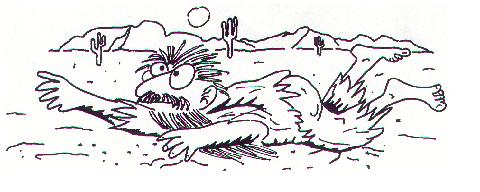Reminiscing. It comes with age and may be the finest wine of maturity, especially if life has blessed one with years of active, interesting adventures, large and small.
Reading the long ago anecdotes and remembrances of Maurie Helle, Andy Limber, Mac Jett and Ray Lindstrom turned a dial somewhere in me, causing a couple of old stories of my own to come tumbling out.
My recollection of the day Ned Warren walked into the offices of Owens & Associates is that he announced himself as the developer of Prescott, Arizona's newest rural subdivision, being marketed to dudes back east.
Warren was actually pitching us, to accept his business. One of his early disclaimers was, "Sure, I'm an ex-con, but all that's behind me now. We'll be upstanding citizens here." Honest, he said it and we went through gales of laughter, later.
Bill Owens eventually agreed to take on the business, on a cash in advance basis, which continued until the deal got so dirty he suggested the account move elsewhere, which was after year or two. In the meantime, the account executive was Vance Wampler, whose days growing up in Prescott and then being a mischievous scamp in adulthood prepared him well for handling a vulture like Warren.
If my memory is to be trusted, the day Warren decided to raise prices, after the Republic & Gazette advertising deadline had passed, presented a special challenge for Vance. Warren expected Vance to convince Lou Reynolds to allow a last minute change in his ad. This wasn't done, of course, and when the ad appeared with the old price, Warren blew a gasket.
He took everybody to task. Calling our office before Vance arrived the next morning, he unloaded on the receptionist, on the media buyer and on me.
A few minutes later, when Vance was told, he wasn't the least flustered. He called Warren, listened patiently for a long time, said he'd be right over to Ned's office, rose and walked out.
I was told later that Vance went to the A. J. Bayless store at Central and Indian School, where he purchased a slice of round steak, wrapped in traditional butcher paper.
On entering Warren's office, he unwrapped the raw meat, flung it paper and all on Warren's desk and declared, "Here's your pound of flesh. What else can I do for you?"
Vance reported that Warren laughed as he carefully rewrapped the meat . We later heard Warren was telling the story to anybody who would listen, but it didn't stop him from being a daily challenge for Vance.
__________________________________________
In 1963, there was no video tape at the local level, although it would arrive not too much later. At KOOL-TV, the choices for video were film, slides and live shots, often of art cards. Local commercials were primitive compared to today, the most advanced being the feature length movies with Jeanne Metzger (Hallcraft Homes), Sherri Chessen (Knoell Homes) and Jack and Acquanetta Ross (Jack Ross Lincoln-Mercury) providing the advertising interludes on local stations.
During the long hours of daytime broadcasting, local control rooms were places of semidarkness lit by flickering monitors and dim spotlights helping the audio and video technicians watch their control boards. Somewhere else, in an adjacent room, another technician was busy loading film and slides in the correct sequence for the next commercial break.
Back in the control room, a director and a booth announcer sat with scripts prepared for them, that were also used by the person loading the film and slides. It was a well choreographed exercise that when everything came together presented the home audience with a smooth transition from one program segment to the next.
When something went wrong, though, such as a slide being out of place or a script page being misfiled, things could get wild, like the day I was there about something connected with the Lew King Ranger Show.
Freddie Catana, an excellent director, was running things in his usual professional manner, but even he couldn't have seen what was coming.
During one station break there was a public service recruiting commercial for the United States Marine Corps, which was followed by a slide that read "Join the Marines." As the slide popped up, Freddie cued the booth announcer to read the voice over copy for the slide.
So, in smooth baritone inflection, the announcer seriously intoned, "For further information, contact the President's Council on Mental Retardation."
Hilarity ensured.





